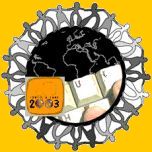| |||||
BerichteA Tale of Budget Crunches and Midnight Oil "There was a huge expectation of our collective failure and a very low expectation of our eventual success"
(von Joyce Mulama, Inter Press Service) NAIROBI - With just days to go before the seventh World Social Forum (WSF) kicks off in Nairobi it's all systems go amongst the organisers, who are preparing to welcome thousands of delegates to the Kenyan capital for the Jan. 20-25 gathering. The yearly forum will provide a platform for groups and individuals who oppose the current system of globalisation û but also a daunting logistical challenge, not least because 2007 will mark the first year in which Africa is serving as sole host of the event. In light of this, we had a pressing question for Onyango Oloo, national co-ordinator of the Kenya Social Forum, which is part of the 2007 WSF organising committee. IPS: Are you ready for the WSF? Onyango Oloo (OO): We are not only ready for WSF 2007, we are eagerly waiting for the event to take off. We have burnt the midnight oil putting together a very hard working, talented team here at the secretariat drawn literally from around the world. We have Kenyans, Tanzanians, Ugandans, Salvadorans, Danes, Hondurans, Canadians (and) people from Senegal, Zimbabwe, Tunisia and many other parts of the world as part and parcel of the core team. We have volunteer interpreters, IT (information technology) personnel, and other skilled personnel toiling day and night for the success of the World Social Forum. IPS: How many people have confirmed participation in the forum? OO: We have been overwhelmed with requests for registration, especially over the last three weeks. To give one example: (earlier this month) we were in Muthuruwa Social Hall (Muthuruwa is a low income housing estate for Kenya Railways employees) talking to people about the WSF. They were hungry for those registration forms. On a daily basis we see people walking into our offices inquiring about where they can register, pay fees - or if we have received and processed their online registration forms. The Kutoka Network (a group of Catholic churches working in slum areas) is organising group and individual registrations using their network of churches in the eastern and western slums of Nairobi. It is difficult to ascertain confirmed registrations, because not allàforms have been processed. My colleague Oduor Ong'wen indicated earlier this week that at least 15,000 had confirmed registration, and those are just the Kenyans. IPS: What about international representation? OO: We expect lots of people from around the world to land in Nairobi. Hundreds have already done so. Every single day someone calls us from the airport informing us of their arrivalàOne statistic is telling: there is a group of 250 activists coming from South Africa, and that is not taking into account the numbers of South Africans who will come on their own. IPS: What are the main challenges that you have encountered while organising this event? OO: The main challenge was perhaps at the psychological level: overcoming perceptions, especially from outside Africa, that this job was perhaps too huge for us to handle as Africans. As one of my colleagues is fond of repeating: there was a huge expectation of our collective failure and a very low expectation of our eventual success. We have proved throughout that we are up to the challenge. The other significant challenge was around resources. It is a miracle that we have been able to make do with the resources at hand, which until recently were below 50 percent of what our budgetary target was. IPS: What would pass as the most rewarding thing that you have encountered during the organisation of this year's WSF? OO: The most rewarding thing is how people in Kenya and other parts of Africa welcomed the idea of the WSF to our part of the world. One of the immediate benefits of that has been the flow of volunteers rushing forward to help WSF Nairobi 2007 be a success. IPS: Is security an issue of concern, given that Kenya has fallen victim to terror attacks in the past? OO: Security is not a major concern. Nairobi has hosted numerous international and regional gatherings. Nairobi is no more insecure than, say, New York, Montreal, Paris or Liverpool. On top of that we have worked closely with the Kenyan government to put in place all the precautionary mechanisms. IPS: What is the thing that you most want to happen at this event? OO: That people will take from the World Social Forum renewed positive energy, additional contacts and networks, and own the process by going back to their respective local communities to work on specific social, cultural, political, economic and other concerns and issues -- with a view to transforming their realities for the better. I am looking forward, for example, to stronger bonds between Asia and Africa - and closer links with the Caribbean, Latin America, and the indigenous people around the world. I want the marginalised social groups in the world, especially women, youth, people with disabilities, cultural and ethnic minorities to be more empowered to determine their respective destinies. |
|||||
Aus www.weltsozialforum.org, gedruckt am: Do, 26.12.2024
© |
|||||
